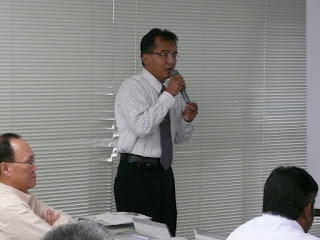
2. Being in my position at this moment has given me more and bigger platforms to promote on why it is so important for us to use our energy wisely.

3, I have gone all over the country and presented papers on various topics n efficient use of energy. From every event that I went, I would able to gauge the general perception of Malaysian on energy issues related to them especially for big energy users from industrial and commercial sectors.

4. Generally, I would see it as not so much about the issues on the technical know-how or their engineering capability to identify the potentials to save energy and implement them.

5. Another common perception is, energy savings are all about installing devices and that will cost them too much. In the end, they tend to ignore on how energy is being managed in their premises and focus is more on other matters related to the core businesses such as production and delivering services to their customers.

6. Energy efficiency always being treated as project or program with its own planned activities and I strongly believe that is one major reason why it is not becoming sustainable. Projects or programs have their own duration and followed by commitments throughout that duration inclusive of financial supports, human resources and etc.
Ideally, there will be follow ups and improvement after each project but very often to see that the supports and commitment needed would not be the same as what were received during the project duration which normally very much less or none. In a long run, no matter how good were the findings or outputs of the projects, it will slowly being forgotten and it will not be impossible for the same project to carried out again in the future by the same (different management team)or different organizations .

7. Total Quality Management, Total Production Management and Health, Safety and Environmental (HSE) Management are common features in most companies at this moment. Energy management normally just apart of environmental management system such as in ISO140001 in most organizations. Most company policies will include Quality and Production which are considered as core areas in the business while safety, health and environment are implemented mainly due to legal requirements and also covered in corporate policies in some prominent or multinational companies.

8. Generally, energy management can be considered as "optional" or ignored by many companies and the energy costs is just something need to be paid. It is often looked "as it is" and almost nothing can be done other than paying it or you will trouble with the utility companies. Sometime they don't even know what tariff that they are in and what they are paying for in every month but all of them are so worry about paying more when there is any tariff hike.

9. Why? It is simply because energy is often not integrated in every part of other management components such as production, quality and others. It is also because energy efficiency has been treated as projects or products and do not require to be implemented is a sustainable manner. Therefore, it does not require total management approaches like other core areas in the organization.

10. I always said to my audiences that even a building which designed as an energy efficient building from the beginning until its completion, it would not be able to be efficient by itself. It needs to managed and it require a management approach to sustain its efficiency level as expected from the design.

11. Energy must be managed if we want to ensure that we want to use it efficiently. Energy management is just like any other area which require the development and the implementation of the system which can make it sustainable. Key components in the management of energy must be tailored and implemented to the needs of each organization and based on resources can be allocated to achieve the management's goals.

12. Having the management system implemented in the organization will ensure the efficient use of energy at all level of employees and in event of the management team changed, the system will remain as apart of one of the core and strategic matters.
13. When I was a consultant and worked with all level of technical personnel in the plant, energy saving measures managed to identified mainly from the input of them. In other words, they can find it themselves with necessary support from the management such as trainings and allocation of resources and time.
14. As a conclusion, energy management system is the key issue here. As I mentioned earlier, it is no so much of the technical barriers and capability to identify and implement energy saving measures but it is more of the change of mindset to adopt energy management across all department or sections in the organization. Energy need to be seen as rewarding as the increase of sales or production volumes because the fact is ONE RINGGIT SAVED IS ONE RINGGIT EARNED. Please bear in mind that the RINGGIT SAVED can be achieved by doing something within our absolute controls which is our very own organization!
